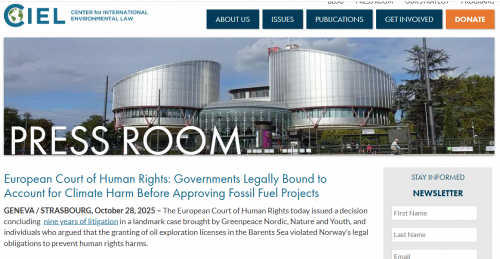
GENEVA / STRASBOURG, October 28, 2025 – The European Court of Human Rights today issued a decision concluding nine years of litigation in a landmark case brought by Greenpeace Nordic, Nature and Youth, and individuals who argued that the granting of oil exploration licenses in the Barents Sea violated Norway’s legal obligations to prevent human rights harms.
While the Court ultimately rejected the legal challenge brought against the Norwegian government’s decision, it did so on the basis that the production of oil in these sites could still be blocked at a later stage of the authorization process.
In today’s ruling, the European Court of Human Rights validated most legal arguments brought forth by Greenpeace Nordic and Nature and Youth with regard to the need for any authorization of new fossil fuel projects to take into consideration the cumulative effects resulting from the combustion of any fossil fuel extracted from these projects.
“This decision sets a powerful legal precedent, giving individuals and NGOs stronger grounds to challenge any new fossil fuel project. It makes clear that governments cannot authorize projects that would cause irreversible climate harm without facing judicial scrutiny”, said Sebastien Duyck, Senior Attorney at the Center for International Environmental Law (CIEL).
“For decades, the fossil fuel industry and its government backers have sought to dodge accountability for the irreversible climate damage their fuels ultimately cause. Today, the European Court of Human Rights made clear that excuse won’t fly — any new project must be judged on the full emissions it would unleash, at home or abroad. The Court’s ruling cements a growing legal consensus that governments have a legally binding obligation to assess the climate impacts of global downstream emissions before authorizing any new fossil fuel projects. And when that assessment is done, expanding fossil fuel production cannot be squared with legal duties to prevent climate harm and protect human rights”, Duyck added.
“Fossil fuel companies should take no comfort from this ruling, which only underscores the risk of sinking money into exploring for oil they cannot permissibly extract,” said Nikki Reisch, Director of CIEL’s Climate and Energy Program.
“This decision does not make the challenged fossil fuel projects any more viable — it just postpones the inevitable. There’s no future in which drilling for this oil — or any oil — becomes more acceptable for the planet or for people than it is today. And under the clear legal principles the Court unanimously reaffirmed, expanding fossil fuel production in the face of an escalating climate emergency is legally indefensible,” Reisch concluded.
For more information
Niccolò Sarno, CIEL Global Media Relations: press@ciel.org
Background Information
People v. Arctic Oil follows a 2016 suit filed by Nature and Youth (Young Friends of the Earth Norway) and Greenpeace Nordic against Norway’s Minister of Energy and Petroleum on the ground that the Ministry’s decision to open new areas of Norway’s Barents Sea to oil and gas exploration violates the right to a healthy environment enshrined in Article 112 of Norway’s Constitution. The groups were later joined by the Grandparents’ Climate Campaign and Friends of the Earth Norway as co-plaintiffs. The case was originally heard in Oslo District Court in 2017 and in Borgarting Court of Appeals in 2019.
In 2017, a coalition of organizations and individuals led by CIEL filed an amicus curiae brief in the case arguing that Article 112 of the Norwegian Constitution must be informed by Norway’s international human rights obligations, including its obligations to protect the environment in a manner that guarantees future generations can enjoy their rights.
While the Borgarting Court of Appeals found in 2020 that the state did not violate Article 112 of the Norwegian constitution, the court also held that Article 112 entitles Norwegian citizens to protection from environmental harms caused by climate change, including harms caused by the combustion of fossil fuels exported from Norway. Despite this recognition, the Court of Appeals found that Norway’s human rights obligations do not extend to the global consequences of climate change, that there was no “real and immediate risk” to human life within Norway, and that there was no ‘direct and immediate link’ between the plaintiffs’ harms and the Minister’s decision to allow expanded oil production in the Norwegian Arctic.
In December 2020, the Norwegian Supreme Court upheld the government’s decision to grant ten oil exploration licenses in the Barents Sea. The Court ruled by an 11–4 majority that the licenses did not violate the constitutional right to a healthy environment under Article 112. The majority concluded that the potential climate impacts from future emissions were too uncertain to justify blocking the licenses at that stage. But the court observed that even significant investments in exploration did not entitle companies to extract any fossil fuels that might be found, stating that the authorities will have the “right and duty” to deny production licenses if granting them would violate the constitutional right to a healthy environment. The Court emphasized however the government’s broad discretion in environmental policy and found no gross negligence in its approach to climate obligations.
Following the Supreme Court’s decision, Greenpeace Nordic, Nature and Youth Norway, and six individual plaintiffs filed a complaint with the European Court of Human Rights in June 2021. They argued that Norway’s approval of the Barents Sea oil exploration licenses violated their rights under Articles 2 (right to life), 8 (right to respect for private and family life) 13 (right to a remedy) and 14 (protection against discrimination) of the European Convention on Human Rights. The applicants contended that the government’s failure to assess the climate impacts of the licenses posed a serious threat to their future well-being. The European Court accepted the case and communicated it to Norway in December 2021.









